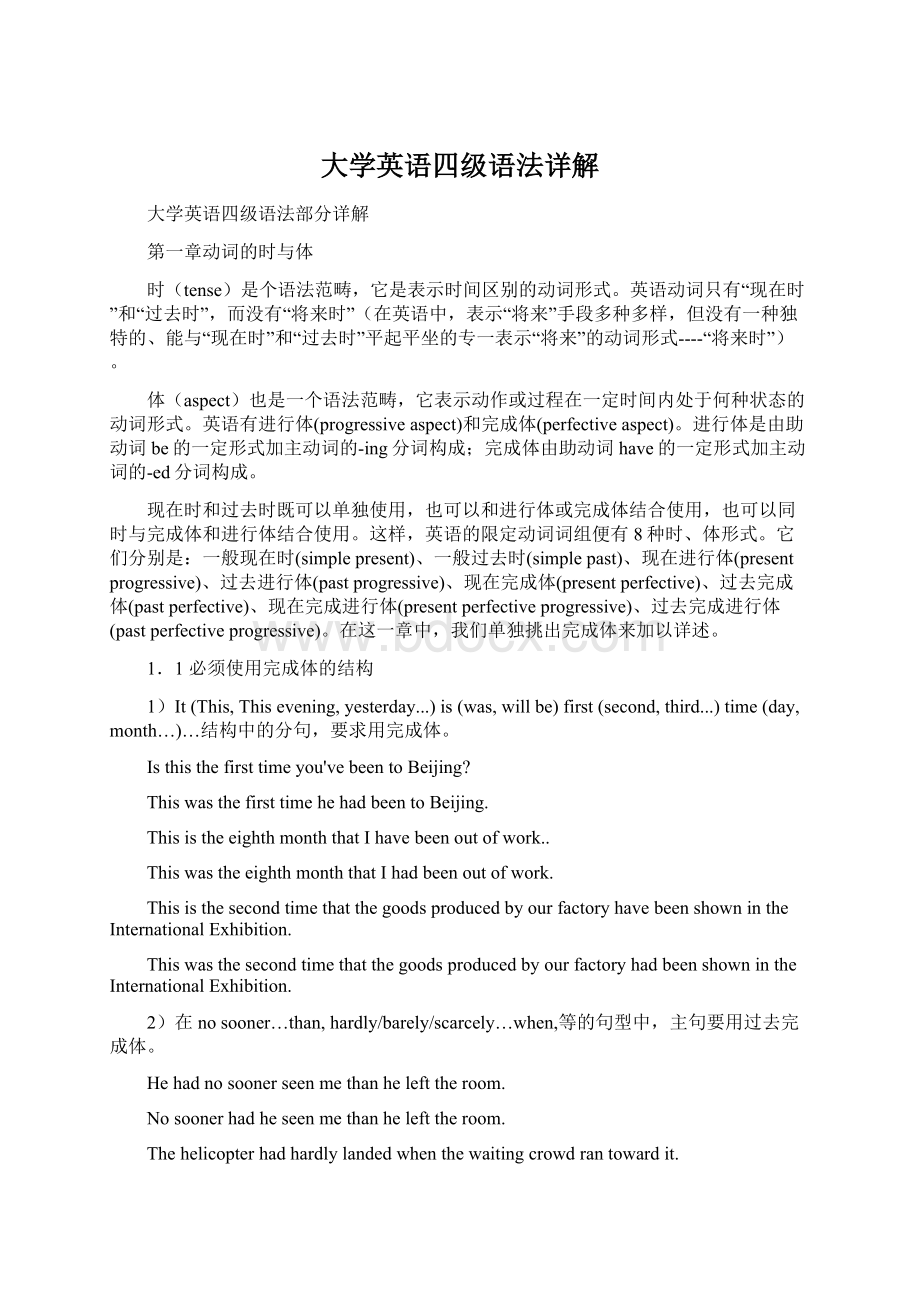大学英语四级语法详解.docx
《大学英语四级语法详解.docx》由会员分享,可在线阅读,更多相关《大学英语四级语法详解.docx(74页珍藏版)》请在冰豆网上搜索。

大学英语四级语法详解
大学英语四级语法部分详解
第一章动词的时与体
时(tense)是个语法范畴,它是表示时间区别的动词形式。
英语动词只有“现在时”和“过去时”,而没有“将来时”(在英语中,表示“将来”手段多种多样,但没有一种独特的、能与“现在时”和“过去时”平起平坐的专一表示“将来”的动词形式----“将来时”)。
体(aspect)也是一个语法范畴,它表示动作或过程在一定时间内处于何种状态的动词形式。
英语有进行体(progressiveaspect)和完成体(perfectiveaspect)。
进行体是由助动词be的一定形式加主动词的-ing分词构成;完成体由助动词have的一定形式加主动词的-ed分词构成。
现在时和过去时既可以单独使用,也可以和进行体或完成体结合使用,也可以同时与完成体和进行体结合使用。
这样,英语的限定动词词组便有8种时、体形式。
它们分别是:
一般现在时(simplepresent)、一般过去时(simplepast)、现在进行体(presentprogressive)、过去进行体(pastprogressive)、现在完成体(presentperfective)、过去完成体(pastperfective)、现在完成进行体(presentperfectiveprogressive)、过去完成进行体(pastperfectiveprogressive)。
在这一章中,我们单独挑出完成体来加以详述。
1.1必须使用完成体的结构
1)It(This,Thisevening,yesterday...)is(was,willbe)first(second,third...)time(day,month…)…结构中的分句,要求用完成体。
Isthisthefirsttimeyou'vebeentoBeijing?
ThiswasthefirsttimehehadbeentoBeijing.
ThisistheeighthmonththatIhavebeenoutofwork..
ThiswastheeighthmonththatIhadbeenoutofwork.
ThisisthesecondtimethatthegoodsproducedbyourfactoryhavebeenshownintheInternationalExhibition.
ThiswasthesecondtimethatthegoodsproducedbyourfactoryhadbeenshownintheInternationalExhibition.
2)在nosooner…than,hardly/barely/scarcely…when,等的句型中,主句要用过去完成体。
Hehadnosoonerseenmethanhelefttheroom.
Nosoonerhadheseenmethanhelefttheroom.
Thehelicopterhadhardlylandedwhenthewaitingcrowdrantowardit.
ScarcelyhadIseenthelightningwhenIheardaclapofthunder.
3)将来完成体用来表示在将来某一时间以前已经完成或一直持续的动作。
经常与before+将来时间或by+将来时间连用,也可与before或bythetime引导的现在时的分句连用。
Iwillhavefinishedalltheworkbythetimeyouarebackthisevening.
IamsurehewillhaveleftParisbythistimetomorrow.
Ihopewewillhavegotalltheinformationbeforeyoucometomorrow.
BythetimeyougettoNewYork,I_______forLondon.(2002年1月)
A)wouldbeleaving B)amleaving
C)havealreadyleft D)shallhaveleft
本题时间状语为by+将来时间,考察将来完成体用法,应选择D)。
BythetimehearrivesinBeijing,we________herefortwodays.(2001年6月)
A)havebeenstayingB)havestayed
C)shallstayD)willhavestayed
将来完成体用来可以表示在将来某一时间以前一直持续的动作,本句话的意思是:
我们将在这里呆两天,因此谓语动词用将来完成体,答案为D)。
1.2现在完成体与现在完成进行体
现在完成进行体兼有现在完成体和现在进行体二者基本特点。
由于它有现在完成体的特点,所以它可以表示某一动作对现在产生的结果或影响。
由于它有现在进行体的特点,所以它也可以表示某一动作的延续性、临时性、重复性、生动性乃至感情色彩。
1)现在完成进行体和现在完成体皆可表示动作对现在产生的结果,但前者所表示的结果是直接的,而后者所表示的则是最后的结果。
Wehavebeencleaningtheclassroom.(a)
Wehavecleanedtheclassroom.(b)
(a)句可译为“我们打扫教室来着”。
其直接结果可能是:
我们身上都是灰。
(b)句可以译为“我们把教室打扫过了”。
其结果是:
现在教室很清洁,可以用了。
另外(a)句表示教室刚刚打扫过,(b)句则可能表示教室是昨天打扫的。
再看下面两个句子:
Becareful!
Johnhasbeenpaintingthedoor.(a)
Johnhaspaintedthedoor.(b)
(a)句表示约翰刚刚把门油漆过,现在油漆还未干,所以你要小心。
(b)句则无此含义,油漆可能已干了。
2)现在完成进行体有时有延续性;现在完成体往往没有。
Theyhavebeenwideningtheroad.(a)
Theyhavewidenedtheroad.(b)
(a)句的意思是他们在加宽马路,但尚未完工。
(b)句的意思则是已完工了。
有时现在完成体有延续性(如一些属于持续体的动词),但无临时性质。
Mr.SmithhasbeenlivinginLondonsince1978.(a)
Mr.SmithhaslivedinLondonsince1979.(b)
(a)句有“史密斯先生在伦敦久居”的含义,(b)句则没有。
3)但现在完成进行体并不总是具有临时的性质。
MymotherhasbeenteachingEnglishfortwentyyears.(a)
MymotherhastaughtEnglishfortwentyyears.(b)
(a)句在此并无临时性质,但较口语化。
(b)句则较为正式。
另外,(a)句表示动作现在仍在继续.并将延续下去;(b)句的动作是否延续下去,须由上下文决定,但在一般情况下都是延续下去的。
4)在完成进行体往往表示动作在重复;现在完成体则常常不带重复性。
Haveyoubeenmeetingherlately?
(a)
Haveyoumetherlately?
(b)
(a)句有“经常相会”之意,(b)句则没有。
(b)句如与often,everyday等时间状语连用,当然也表示动作在重复。
5)在否定结构中,现在完成体所否定的是谓语动词;现在完成进行体所否定的是状语。
Hehasn'tbeenspeakingsincethreeo'clock.(a)
Hehasn'tspokensincethreeo'clock.(b)
(a)句中所否定的不是hasbeenspeaking,而是sincethreeo'clock,其结构等于Hehasbeenspeakingnotsincethreeo'clockbutsincehalfpastthree.这是因为现在完成进行体本身是没有否定结构的原故。
(b)句用的是现在完成体,而现在完成体是有否定结构的,所以(b)句中所否定的自然是hasspoken,意即“从三点起他一直沉默不语,未发一言”。
1.3情态动词+行为动词完成体
1)must+have+V-ed
指现在对过去已发生的事或可能出现的情况进行推断和猜测,表示推测过去某事“一定”发生了。
因此,Youmustseeherlastnight的说法是错误的。
Shemusthavemetaghostyesterday.她昨天一定碰见过鬼了。
Hemusthavebeentherelastweek.他上周一定在那儿。
HisscoreontheEnglishtestisthehighestintheclass;hemusthavestudiedlastnight.他这次英语测试的成绩全班最高。
他昨晚一定在好好学习。
2)can’t/couldn’t+have+V-ed
can’t/couldn’t+have+V-ed为must+have+V-ed的否定形式,指现在对过去已发生的事或可能出现的情况进行推断和猜测,表示过去不可能发生某事。
Theycan’thavecomehereintheircaryesterday,foritwasthenunderrepair.他们昨天不可能开车到这里,因为那时他们的车还正在修理当中。
Theroomisinamess;itcan’t/couldn’thavebeencleaned.
3)may/might+have+V-ed
表示推测过去某事“也许”发生了。
Hemay/mighthavechosenanothercareerifhehadhadenoughmoneytofurtherhiseducation.如果他那时有足够的钱继续受教育,他也许会选择另一个职业。
Imighthavefulfilledtheworkearlier.我本可以早一些完成这件工作的。
4)oughtto/should+have+V-ed和oughtnot/shouldn’t+have+V-ed
对以发生的情况表示“不满”、“责备”,分别表示“本应该…”和“本不应该”
Iwonderwhytheyhaven’tarrivedyet.Itoldthemhowtogetthere,butperhapsIought/shouldgivethemamap.(含有“后悔”或“自责”之意)
Yououghttohavetoldmethatyesterday.你早在昨天就该把那件事告诉我了。
5)needn’t+have+V-ed
表示过去做了某事,但没有做的必要,意为“本没必要…”。
Youneedn’thavehurried.
Sheneedn’thavecomeinperson---aletterwouldhavebeenenough.
Youneedn’thavedoneallthosecalculations.Wehaveacomputertodothatsortofthing.
1.4用在was/were,planned,intended,hoped,wished+不定式完成体
表示事实上并未实现的计划或行为。
(详见3.3不定式完成体)
Weweretohavestartedat8lastnight,butitsnowedheavily.
Theyintendedtohavegonecamping,buttheylatercancelledit.
Ihopedtohavefinisheditlastweek,butIwastoobusy.
练习
1.Suchcrimesmaybesocomplexthatmonthsoryearsgobybeforeanyonethem.(2002年12月)
A)discoversB)discoveredC)willdiscoverD)wouldhavediscovered
2.Infact,PeterwouldratherhaveleftforSanFranciscothan_______inNewYork.(2002年6月)
A)tostayB)stayingC)stayedD)havingstayed
3.Therehasbeenagreatincreaseinretailsales,_______?
(2002年6月)
A)doesthereB)hasn'tthereC)isn'titD)isn'tthere
4.TheboyspentasmuchtimewatchingTVashe________studying.(2002年1月)
A)does B)had C)was D)did
5.Thearticlesuggeststhatwhenaperson_______underunusualstressheshouldbeespeciallycarefultohaveawell-balanceddiet.(2002年1月)
A)is B)were C)be D)was
6.Bytheendofthismonth,wesurely____asatisfactorysolutiontotheproblem.
A)havefoundB)willbefound
C)willhavefoundD)arefinding
7.Theconference____afullweekbythetimeitends.
A)musthavelastedB)willhavelasted
C)wouldlastD)haslasted
8.---"MayIspeaktoyourmanagerMr.Williamsatfiveo'clocktonight?
"
---"I'msorry.M.Williams_______toaconferencelongbeforethen."(2000年6月)
A)hadgoneB)wouldhavegoneC)hasgoneD)willhavegone
9.Sheoughttostopwork;shehasaheadachebecauseshe________toolong.(2000年1月)
A)hasbeenreadingB)hadreadC)isreadingD)read
10.Thecarelessmanreceivedaticketforspeeding.Hehavedrivensofast.(2002年12月)
A)can’tB)mustn’tC)wouldn’tD)shouldn’t
11.Investigatorsagreedthatpassengersontheairliner____attheverymomentofthecrash.(2002年6月)
A)oughttodieB)musthavediedC)mustbedyingD)shouldhavedied
12.You_______himsoclosely;youshouldhavekeptyourdistance.(2000年6月)
A)shouldn'thavebeenfollowingB)couldn'thavebeenfollowing
C)mustn'tfollowD)shouldn'tfollow
13.Theconstructionofthelaboratorybytheendofthisyear.
A)willhavecompletedB)willhavebeencompleted
C)willbecompletedD)willcompleted
14.JackhasjustphonedtosaythathebacktillSundaynextweek.
A)doesn’tcomeB)willcome
C)hasn’tcomeD)isn’tcoming
15.Taketheumbrellaincaseit.
A)israiningB)isgoingtorainC)rainsD)willrain
16.Bytheendoflastyear,Iinthisuniversityfortenyears.
A)hadworkedB)worked
C)wasworkingD)wouldwork
17.Pickmeupat9o’clock.Imybathbythen.
A)canhavehadB)willhavehad
C)willbehavingD)mayhave
18.IaglasswhileIthedinner.
A)broke…wascookingB)wasbreaking…wascooking
C)wasbreaking…cookedD)broke…cooked
19.“MichaelleftforNewYorkthismorning.”
“Oh,Ithoughtheuntilnextweek.”
A)hadn’tbeengoingB)wasn’tgoingC)isn’tgoingD)won’tbegoing
20.Ithasbeenalongtimesincetheylasteachother.
A)weremeetingB)weretomeet
C)metD)meet
21.Eversincethefamilymovedtothesuburbslastyear,theybetterhealth.
A)hadenjoyedB)areenjoyingC)havebeenenjoyingD)couldhaveenjoyed
22.Youshouldhaveputthemilkintheice-box;Iexpectitundrinkablebynow.
A)hadbecomeB)becomeC)hasbecomeD)became
23.Thisisoneoftherarestquestionsthatatsuchameeting.
A)areraisedB)haveeverbeenraisedC)israisedD)haseverbeenraised
24.Whenhehurriedtotheairport,hefound,tohisgreatdisappointment,histicketathome.
A)tohavebeenleftB)hadleftC)wereleftD)hadbeenleft
25.ThenovelissaidintosevenlanguagesincludingRussian.
A)tohavebeentranslatedB)tobetranslated
C)havetranslatedD)havingtranslated
26.Weourownbusiness,butweneverhadenoughmoney.
A)hopedtohavestartedB)hopedtostart
C)hopetostartedD)hopetohavestarted
27.whenshestartedcomplaining.
A)NosoonerhadhearrivedB)Scarcelydidhearrive
C)HardlyhadhearrivedD)Notuntilhearrived
28.Therewasaknockatthedoor,itwasthesecondtimesomeonemethatevening.
A)wouldhaveinterruptedB)tobeinterrupted
C)tohaveinterruptedD)hadinterrupted
29.Turnonthetelevisionoropenamagazineandyouadvertisementsshowinghappy,balancedfamilies.
A)haveoftenseenB)willoftensee
C)oftenseeD)areoftenseeing
30.Theyhurriedthereonlytofindthemeetingcancelled.Infact,theyatall.
A)needtohavegoneB)wouldn’thavegone
C)needn’thavegoneD)mustn’thavegone
第二章被动语态
2.1主动态表示被动意义
1)一般说来,表示被动意义要用被动态,构成被动态的动词必须是